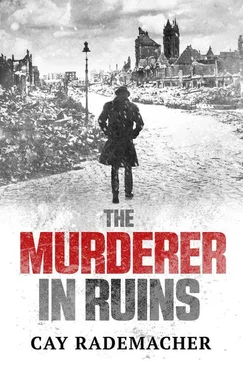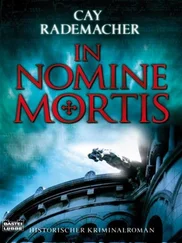Cay Rademacher - The Murderer in Ruins
Здесь есть возможность читать онлайн «Cay Rademacher - The Murderer in Ruins» весь текст электронной книги совершенно бесплатно (целиком полную версию без сокращений). В некоторых случаях можно слушать аудио, скачать через торрент в формате fb2 и присутствует краткое содержание. Год выпуска: 2015, ISBN: 2015, Издательство: Arcadia Books Limited, Жанр: Триллер, на английском языке. Описание произведения, (предисловие) а так же отзывы посетителей доступны на портале библиотеки ЛибКат.
- Название:The Murderer in Ruins
- Автор:
- Издательство:Arcadia Books Limited
- Жанр:
- Год:2015
- ISBN:9781910050750
- Рейтинг книги:5 / 5. Голосов: 1
-
Избранное:Добавить в избранное
- Отзывы:
-
Ваша оценка:
- 100
- 1
- 2
- 3
- 4
- 5
The Murderer in Ruins: краткое содержание, описание и аннотация
Предлагаем к чтению аннотацию, описание, краткое содержание или предисловие (зависит от того, что написал сам автор книги «The Murderer in Ruins»). Если вы не нашли необходимую информацию о книге — напишите в комментариях, мы постараемся отыскать её.
The Murderer in Ruins — читать онлайн бесплатно полную книгу (весь текст) целиком
Ниже представлен текст книги, разбитый по страницам. Система сохранения места последней прочитанной страницы, позволяет с удобством читать онлайн бесплатно книгу «The Murderer in Ruins», без необходимости каждый раз заново искать на чём Вы остановились. Поставьте закладку, и сможете в любой момент перейти на страницу, на которой закончили чтение.
Интервал:
Закладка:
‘Why did you settle on the history of Prussia? A pretty esoteric subject in Oxford, I’d imagine.’
‘Esoteric subjects are what Oxford is all about,’ MacDonald replied with a nostalgic smile. Then all of a sudden he turned serious.
‘Do you have any idea what it’s like living in a society based on class, Chief Inspector? Earls and dukes, exclusive private schools, London clubs, stiff upper lips, ancestors who came over with William the Conqueror?’
Stave shook his head, and then, to his own surprise, nodded. ‘Here we had party members, German blood or non-Aryan; you didn’t need to have aristocratic ancestors, but it helped in a big way if you’d been on the 1923 demonstration at the Feldherrnhalle in Munich or at least had joined the party before 1933.’
‘But you didn’t join in any of that.’
‘I had German blood, nothing I could do about that, but the party? No thanks.’
MacDonald stared silently ahead. On either side of the street lay slabs of concrete, piles of fallen roof tiles and twisted piping like some surreal sculpture. One four-storey facade stood on its own, with torn curtains flapping in the wind like flags. Then came an area completely cleared of rubble with two dozen Nissen huts standing on it, like corrugated iron pipes cut down the middle: barracks put up by the Brits as emergency housing for the homeless.
‘I wasn’t born with a stiff upper lip,’ the lieutenant said eventually. ‘My parents have a junk shop in Lockerbie, a little town in the south of Scotland. But I didn’t want to spend my life in a nowhere. I studied hard and won a scholarship to Oxford. Then I chose German history because I was sure that sooner or later we’d be at war with you again. It was obvious that after the First World War you still held a grudge against us. I said to myself: know your enemy, that way you can be useful to your country.’
‘Seems to have worked all right,’ Stave muttered.
MacDonald smiled. ‘At first I wondered if maybe I shouldn’t have stayed in Berlin that summer of 1939. Hitler looked certain to win. But things worked out differently and so here I am, in Hamburg. You might not believe me, Chief Inspector, but even in the state it’s in now, I prefer this city to the dump I grew up in.’
‘You’re right; I don’t believe you,’ Stave replied wearily. ‘Straight ahead, on your right. We’re nearly there. At least I imagine our cemetery is bigger than Lockerbie’s.’
They stopped by the low, wide entrance gate. Before the war the cemetery had been a big, beautiful park with roads running through it, and even bus stops. Now nearly all the trees and shrubbery had been hacked to the ground for firewood, and many of the graves had gone to ruin because nobody had the strength or energy to look after them, or often because there just wasn’t anybody left.
Stave and MacDonald strolled along a straight path that led to the centre of Ojendorf Cemetery. There were a lot of fresh graves, the chief inspector noted. Then he noticed a grove, like a little garden within the cemetery, for cremation urns with flowers next to them. There were no recent ones; these days nobody was about to waste expensive fuel on burning dead bodies. In the midst of the garden was a bronze statue of a female mourner, seated. Amazing that hasn’t been stolen yet, Stave thought.
The statue suddenly made him think of Margarethe, even though there was no facial resemblance to his late wife. He turned away so the lieutenant wouldn’t notice him struggling to maintain his composure. Margarethe was buried in Ojendorf Cemetery but Stave couldn’t face going to visit her grave with the lieutenant. He said nothing and just quickened his pace.
They arrived in time to see a tired pastor, two coffin bearers, and an open grave. The ground all around was frozen to about a metre below the surface. Stave wondered how they’d managed to dig a hole; with pickaxes rather than spades in all likelihood.
The pastor mumbled a prayer, holding a black bible in hands that were blue with cold. He was in a hurry. Stave couldn’t make out a word he said. He and the lieutenant remained in the background, discreetly glancing around them. There was nobody else to be seen. The pall-bearers dragged the coffin over to the graveside and laid it on two planks. Then they opened it and the body wrapped in a grey cloth tumbled out as if falling through a trap door and hit the earth with a dull thump. In the silence it was frighteningly loud. The two men put the lid back on the re-usable coffin and carried it off. They would need it again; that saved wood too. The pastor nodded to Stave and MacDonald and walked off.
‘We needn’t have bothered,’ the lieutenant murmured, clapping his hands together.
‘It was worth a try,’ Stave said. But his voice was muted.
An Old Man
Saturday, 25 January 1947
Stave was sitting in the twilight in his flat, warming his hands on a cup of steaming ersatz coffee, slowly sipping at the bitter liquid. He should really have been up and out long ago, walking the platforms of the main station from early morning, asking for news of his son.
Karl was their only child. They would have liked more, Margarethe and he, but there had just been the one; the doctors never found out why. Karl would be 19 now, Stave thought to himself. If he was still alive, that was.
He wished they hadn’t argued back then when Karl volunteered for the front. Youthful idealism. Bravery. Or just because he despised his father? He had to try to find him.
But on the other hand, Stave was tired. True, he had got out of bed early enough, out of habit, but he’d rearranged the furniture a bit, and chewed on some dry bread with a bit of thin yoghurt. Breakfast and lunch all together. By now it was already past two o’clock in the afternoon and he still hadn’t left the house. He was afraid he would spend yet another weekend searching in vain for his son, afraid of stopping one shabby figure after another to ask in vain if they might know or have seen him, afraid of the empty looks, the shrugs of indifference.
And then the past week at work had got to him. Nothing. Nothing at all. Nobody had responded to the poster offering a reward, not even the usual crazies who as a rule never missed a chance. It had probably been too cold, even for a nutcase, to go out to the nearest police station. But was it really possible, that a young woman could go missing in the middle of Hamburg without anyone noticing? Even if she had no family, no friends, surely there was a neighbour who would recognise her. Stave knew what it was like in the Hochbunker and the other places where people took refuge. If anyone left, their place was taken immediately, as if they’d never been there. But surely the photograph on the poster would have driven even the most hardened bunker-dweller to go to the police.
Breuer and Ehrlich had left him to it, but the chief inspector knew they expected him to turn something up. But what? He had no idea. He felt at his wits’ end, frozen cold and most of all would have liked to just curl up under the blanket on his bed.
So he was almost relieved when there was a knock at the door. He would have to get up to answer it, whoever it was.
When he opened the door to Ruge, Stave knew he could no longer hide away from the real world. The young beat policemen stood up straight and took a deep breath, but the chief inspector interrupted whatever he was about to say.
‘If you’ve come to report the discovery of another corpse, then come in before you say anything,’ he said quietly. ‘No need to announce it to all and sundry in the stairwell.’
The young man gave an embarrassed smile, entered the narrow hallway and removed his cap. ‘I’m sorry, Chief Inspector, it always seems to happen when I’m on duty. I hope that doesn’t start to make me a suspect.’
Читать дальшеИнтервал:
Закладка:
Похожие книги на «The Murderer in Ruins»
Представляем Вашему вниманию похожие книги на «The Murderer in Ruins» списком для выбора. Мы отобрали схожую по названию и смыслу литературу в надежде предоставить читателям больше вариантов отыскать новые, интересные, ещё непрочитанные произведения.
Обсуждение, отзывы о книге «The Murderer in Ruins» и просто собственные мнения читателей. Оставьте ваши комментарии, напишите, что Вы думаете о произведении, его смысле или главных героях. Укажите что конкретно понравилось, а что нет, и почему Вы так считаете.











